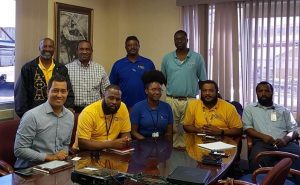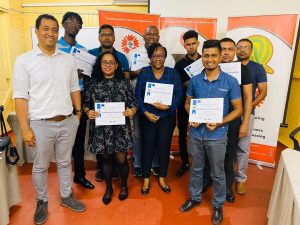A Look into The Hands-On Elements of RQI
- crosqblog
- on Mar, 06, 2020
- Category 11th EDF EPA TBT Programme, Cooperation, Demand for Quality
- Comments Off on A Look into The Hands-On Elements of RQI
Part 2 of "What Building the RQI Looks Like"
by David Tomlinson - Technical Officer, Metrology
I recently undertook two missions with the aim of helping national bureaux improve their quality services. Those bureaux were the Bahamas Bureau of Standards & Quality (BBSQ) and the Guyana National Bureau of Standards (GNBS). This is an in-depth look at those missions to provide an idea of what goes into helping construct healthy and sustainable regional quality measurement frameworks and systems.
The Bahamas - Building Good Metrology Systems
Having been established in 2016, the Bahamas Bureau of Standards & Quality (BBSQ) is one of the youngest National Bureaus of Standards (NSBs) within the Caribbean Community (CARICOM). Notwithstanding its age, the BBSQ has been vigorously developing the National Quality Infrastructure within the Commonwealth of The Bahamas and playing its part in developing the Regional Quality Infrastructure within CARICOM.
One of the first areas to be developed by the BBSQ was the legal metrology service to verify commercial weighing instruments and fuel dispensers.
Now it must be explained that metrology is all about weights and measurements and the traceability thereof – described at its most simple.
To ensure the accuracy and traceability of the working standards, as well as serve the calibration needs of industry, the BBSQ decided to develop its own mass metrology laboratory and under the 10th European Development Fund – Economic Partnership Agreement (EDF-EPA) Caribbean Regional Indicative Programme – Technical Barriers to Trade (CRIP-TBT) Project, the BBSQ was provided with national standards for mass metrology. To complement the donation of equipment by the 10th EDF-EPA CRIP-TBT Project, the BBSQ purchased a mobile laboratory designed within a 40-foot shipping container.
Since the BBSQ currently does not have competence for mass calibrations, the CROSQ Secretariat was requested to provide technical assistance to assess the suitability of the newly purchased container laboratory, as well as assess the current demands for an industrial metrology service.
As Technical Officer – Metrology at the CROSQ Secretariat, I was assigned to this mission which was conducted from the 17th to 21st February 2020. Once settled, discussions were held with the stakeholders in the petroleum, pharmaceutical, construction and transportation sectors in both Nassau, New Providence and Freeport, Grand Bahama to understand the current calibration systems and where the potential gaps exist.

The CROSQ and BBSQ team meeting with Sun Oil Limited. Sun Oil Ltd. has been a long-standing supporter of the BBSQ and an outstanding source of guidance and information in guiding the development of the BBSQ.
Based on these discussions, it was discovered that there is a high demand for the mass calibration service to provide measurement traceability to the masses, volumetric measures and master flowmeters that are currently being used by industry. Additionally, the recent devastation by Hurricane Dorian has created a concern about the quality of construction materials, particularly reinforcing steel bars, concrete strength and hollow concrete blows, and a testing service for these materials could be developed by the BBSQ once it is given the required regulatory and financial support from the Government.
Guyana - Developing a Sustainable NQI through Skilled Resources
As a critical part of developing a sustainable National Quality Infrastructure (NQI), the Guyana National Bureau of Standards (GNBS) has taken the decision to develop its testing capability to complement its industrial metrology service. Given the expected economic boom driven by the oil sector, the GNBS is expecting a significant increase in the construction sector and therefore prioritised developing its capability to support this sector.
The first two (2) testing services that were earmarked for development were the verification of concrete compression testing machines according to the ASTM International E4 standard and the testing of hollow concrete blocks. With the technical guidance of the CROSQ Secretariat and the Grenada Bureau of Standards (GDBS), the GNBS was able to purchase a 3 MN compression load cell for use in the verification of compression testing machines and a 500,000 lbf capacity concrete compression testing machine to test the hollow concrete blocks.
Once the equipment was received at the GNBS, the staff then required training to be able to provide this service and the CROSQ Secretariat was asked to assist in identifying a consultant who could facilitate the course on the verification of concrete compression testing machines. Once again, my services were specifically requested as a suitable facilitator based on my experience working in a similar verification programme in Jamaica from 2006 to 2010. The training dates selected were the 25th to 28th February, 2020 at the GNBS Head Office in Georgetown, Guyana where nine (9) GNBS employees were trained.
The objective of this activity was to provide the GNBS with the training and tools they would require in order to begin the verification of concrete compression testing machines according to the ASTM E4 standard. A four (4) day agenda was drafted that included the theory on force measurement, the estimation of measurement uncertainty, the ASTM E4 standard, practical exercises on the GNBS and client equipment and data analysis.

Successful participants with their certificates alongside Mr. David Tomlinson, Technical Officer – Metrology of the CROSQ Secretariat.
On the first day, I presented on force measurements, the ASTM E4 standard including the verification procedure, requirements and calculations and on the estimation of measurement uncertainty. The second and third days were scheduled as practical sessions where the participants would first see a complete verification conducted and then perform supervised verifications on client equipment. These exercises were conducted at the Ministry of Public Infrastructure, BK Supermix and the University of Guyana. The final day was focused on data analysis where the participants were able to determine each machines conformance with the ASTM E4 standard.




